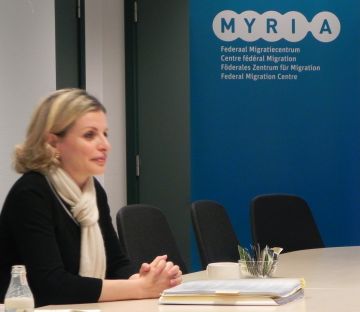International
Migration and human trafficking are global phenomena. International monitoring and information-sharing are necessary to understand them well and to set them in the proper context. This is why Myria has formed a strong international network, and has been a part of various collaborations.
The European Migration Network provides up-to-date, objective, reliable and comparable information to inform decisions on migration and asylum both in Belgium and within the European Union. Myria is on the EMN national Contact Point executive board, and actively participates in day-to-day operations, as does the Immigration Office (incidentally also responsible for coordination), the General Commission for Refugees and Stateless Persons (GCRSP), and Fedasil, the Federal Agency for the Reception of Asylum Seekers.
Myria is an operational partner of UNHCR Belgium regarding the issue of family reunification of persons enjoying international protection in Belgium.
The European Network of National Human Rights Institutions (ENNHRI) is a body of national human rights institutions (NHRI) from all over Europe. NHRIs are institutions that are funded by the state, are independent from their government, and have a broad legal or constitutional mandate to promote and protect fundamental human rights.
In June 2007, ENNHRI put into place the Asylum and Migration working group, which the Federal Migration Centre continues to play an active part in. Myria also provides the juridical working group with its strategic litigation expertise.
Report
As a member of ENNHRI, the European Network of Human Rights Institutions, Myria has contributed to the realisation of the report : « Migrants' Access to Information on Their Rights Recommendations to Bridge Theory and Practice. » In 2017, national human rights institutions (NHRIs) from 12 European countries (including countries of arrival, transit and destination for migrants) collaborated on the issue of access to information on the rights of migrants residing in Europe in detention centres and shelters. With this analysis, ENNRI can provide national and European policy makers with indicative information regarding its human rights concerns in the region.
The Fundamental Rights Agency (FRA) is one of the European Union’s decentralized agencies. It collects and analyses data within the EU and advises European institutions and member states with the aim of gaining a better understanding of and ensuring the basic rights of all. Myria plays an active role in several of its projects and studies.
Following the decision of the European Council of 4 June 2009, an informal network of national reporters on “human trafficking” and equivalent mechanisms was established. The rapporteurs are responsible for monitoring how international policy on human trafficking is put into action and they play a key role in data collection. These reports are carried out twice a year by the European Commission. Myria is a member of this network, acting as an independent correspondent, alongside the Interdepartmental Coordination Unit, which reports on behalf of the Belgian State.
As part of its role around trafficking, the Centre is part of and continues to invest itself in the European network of national reporters.
In association with the Federal Public Service for Employment, Myria helps prepare the OCDE’s Migration Outlook. This publication analyses recent migration movements and policy, along with monitoring the impact of migration on the labour market in countries in the OCDE. The report includes files for each country and statistics.

